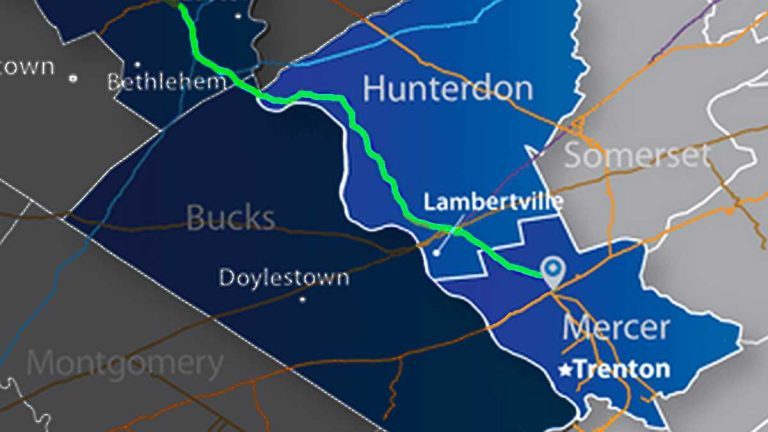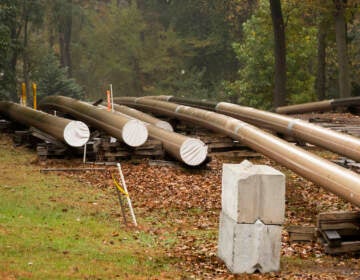Pipeline showdown: PennEast files for eminent domain against 130 landowners
By far the biggest hit is coming in Hunterdon County, a wealthy rural area of rolling hills and Delaware River-side towns.

This shows part of the PennEast Pipeline route. (PennEast Pipeline)
Tim Seggerman wanted to retire to a custom-built house in the woods of Hunterdon County where he could enjoy the rural peace and look out on an adjoining farm.
Seggerman, 67, a New York City-based architect, cashed in his 401K and sank $215,000 into a three-quarter acre lot near Stockton where he pulled down a dilapidated house, designed its replacement, and began to build it himself.
But the one-man construction project stopped about four years ago when the PennEast Pipeline Co. announced plans to build a natural gas pipeline that would run along a right of way now occupied by a paved driveway about 75 feet from his partially built home.
The company initially offered him $9,000 in compensation for its plan to take a small slice of his land, which would include his water well. Seggerman rejected the offer because it didn’t recognize that his new house would be effectively ruined by being closer to the pipeline than allowed by construction rules, and so would never get a certificate of occupancy.
Final offer
-
Tim Seggerman is being sued by PennEast. (NJ Spotlight)
In January, the company made a final offer of about $25,000 but Seggerman rejected that too, arguing that even the larger amount wouldn’t come close to making him whole.
“If they take one tenth of the land, they will pay you one tenth of what they say the value is, even though by having a pipeline, it lowers the rest of the value,” he said Tuesday in an interview on his property.
Now, Seggerman is being sued along with 129 other New Jersey landowners who have refused PennEast’s offers of compensation for taking a total of 154 acres of permanent right of way on their properties. The lawsuits, filed in federal court between Feb. 6 and 14, are seeking eminent domain over those parcels, igniting a new storm of protest from communities along the route that have been fighting the pipeline plan since it was announced in 2014.
By far the biggest hit is coming in Hunterdon County, a wealthy rural area of rolling hills and Delaware River-side towns where 119 parcels totaling 126 acres of permanent right of way would be taken if a federal judge rules for PennEast. The figures, based on the court filings, were calculated by Mike Spille, founder of West Amwell Citizens Against the Pipeline and The cost of the pipeline, a website that tracks PennEast’s plans across New Jersey and Pennsylvania.
Within Hunterdon County, Delaware Township would see the most takings, with 34 parcels covering some 33 acres of permanent right of way, according to a spreadsheet published on the website.
Installed in perpetuity
The easements sought by Penn East are both permanent — where pipeline infrastructure would be installed in perpetuity, and temporary — where the company would place its supplies and equipment during construction, and then restore after the work is completed. Across the state, the company aims to take 154 acres of permanent easements and 283 acres of temporary easements, both of which are included in landowners’ compensation offers.
In Mercer County, the only other New Jersey county that’s being targeted by PennEast, Hopewell Township would see the pipeline built on 28 parcels covering about 29 acres, according to the data.
Pat Kornick, a spokeswoman for PennEast, declined on Wednesday morning to confirm the number of suits filed in New Jersey, or whether the company plans to file any more. She also refused comment on the company’s negotiations with Seggerman or any other landowners.
“In deference to all landowners and the integrity of the process, PennEast honors as confidential negotiations between landowners and PennEast and will not be offering additional comment regarding specific discussions with landowners,” Kornick said in a statement.
She said the company views eminent domain as a “last resort” and that PennEast is continuing to negotiate with landowners.
Some landowners have agreed terms
Some landowners have agreed compensation terms with the company since the Federal Energy Regulatory Commission issued its “Certificate of Public Convenience and Necessity” for the project in mid-January. The federal approval, which allows the company to begin eminent domain proceedings, reduced the number of landowners holding out against PennEast because they anticipated receiving less compensation in eminent domain than they would from the earlier offers, and because they wanted to avoid the expense of hiring lawyers, sources said.
But the filings indicate that about 70 percent of landowners on the New Jersey portion of the route are still rejecting compensation offers and refusing to give company surveyors access to their land, consistent with the numbers earlier in the process, Spille said. He cited GIS mapping showing a total of 210 parcels along the route in the New Jersey.
About 80 percent of the permanent acreage sought by PennEast for the entire route is in New Jersey. The rest is in Pennsylvania where the company has also been filing eminent domain suits over the last week.
The $1 billion pipeline is due to carry natural gas about 120 miles from Luzerne County, Pa. to Mercer County, NJ. PennEast says it will increase the access to low-cost gas for utilities and consumers in both states but critics including the New Jersey Rate Counsel, an advocate for utility ratepayers, say the line is not needed, and will eventually be rendered obsolete by the growth of renewable fuels. The company says it expects to complete construction this year, and to start operating the line in 2019.
‘Ridiculous’ offer
Near Milford, NJ, Philip and Linda Snyder have been trying since 2014 to negotiate an agreement with PennEast which wants to build the pipeline across their 22-acre lot overlooking the Delaware River.
The couple, who have lived on the property for the last 10 years, rejected an initial offer of $38,000 for about three of their acres as “ridiculous,” Philip said in an interview in their home on Tuesday. He also declined a later sum of $78,000.
PennEast then offered $250,000 on the condition that the Snyders accept within 15 days, but then allowed the offer to expire after failing to give them the information they needed to make a decision within that time, Philip said.
Philip, 69, a carpenter who said he has diabetes and arthritis, said the couple were counting on the property to fund their retirement but now worry that its value will be sharply cut if the pipeline goes through.
“I expect that my property will become the axis of drill rigs, traffic, noise, dirt and dust which I will have to pass every day to get home,” he wrote in a letter to PennEast in January. “The aesthetics of the property will be ruined forever and will look ridiculous to any buyers in the future.”
Fight is ‘a long way from over’
At a public meeting in Kingwood Township near Frenchtown on Tuesday, community leaders urged about 100 attendees to continue their resistance to the pipeline despite the court filings and the FERC certificate.
“This fight is a long way from over,” said Susan Meacham of Concerned Citizens Against the Pipeline, noting that the pipeline still needs permits from New Jersey’s Department of Environmental Protection, which last week issued its latest rejection of PennEast’s application for a wetlands certificate, and the Delaware River Basin Commission, which has yet to begin its permitting process.
Meacham urged landowners to eject any company representatives who seek access to their properties before the courts rule on the eminent domain suits.
“If a land agent comes up and says he can come on your property because of the FERC ruling — he’s lying,” she said. “Take a photo, get his license plate, and call the police.”
But she warned landowners to avoid any violence or intimidation that the company could use to support its request to the courts that pipeline construction crews should be accompanied by armed federal marshals.
“That is exactly what they want,” she said. “We have to make sure we do not give them anything to work with.”
Obsolete in 20 years?
Jeff Tittel, director of the New Jersey Sierra Club, urged landowners not to sign easements because the company would then have a right to that portion of private land even if the pipeline never gets built. He said some Pennsylvania landowners agreed to easements for construction of the New York-Pennsylvania Constitution Pipeline, whose future is now in doubt because of denials by New York State, a federal appeals court, and by FERC itself, but the easements will still exist even if the project eventually fails.
On his Stockton property, Seggerman predicted that even if the pipeline is built, renewable fuels will eventually put PennEast out of business.
“It’s an unbelievable thing that we would have to be fighting something that in 20 years will be obsolete anyway,” he said. “The whole world is moving away from this and natural gas is just as polluting as anything else.”
Seggerman has now resumed construction of his home’s cypress-clad interior, partly because he is becoming hopeful that the project will be rejected by New Jersey’s DEP under its new leadership which he said is more environmental aware than its predecessor.
“I’ve seen the way money usually wins out but I have also seen moments where people win,” he said.
WHYY is your source for fact-based, in-depth journalism and information. As a nonprofit organization, we rely on financial support from readers like you. Please give today.





